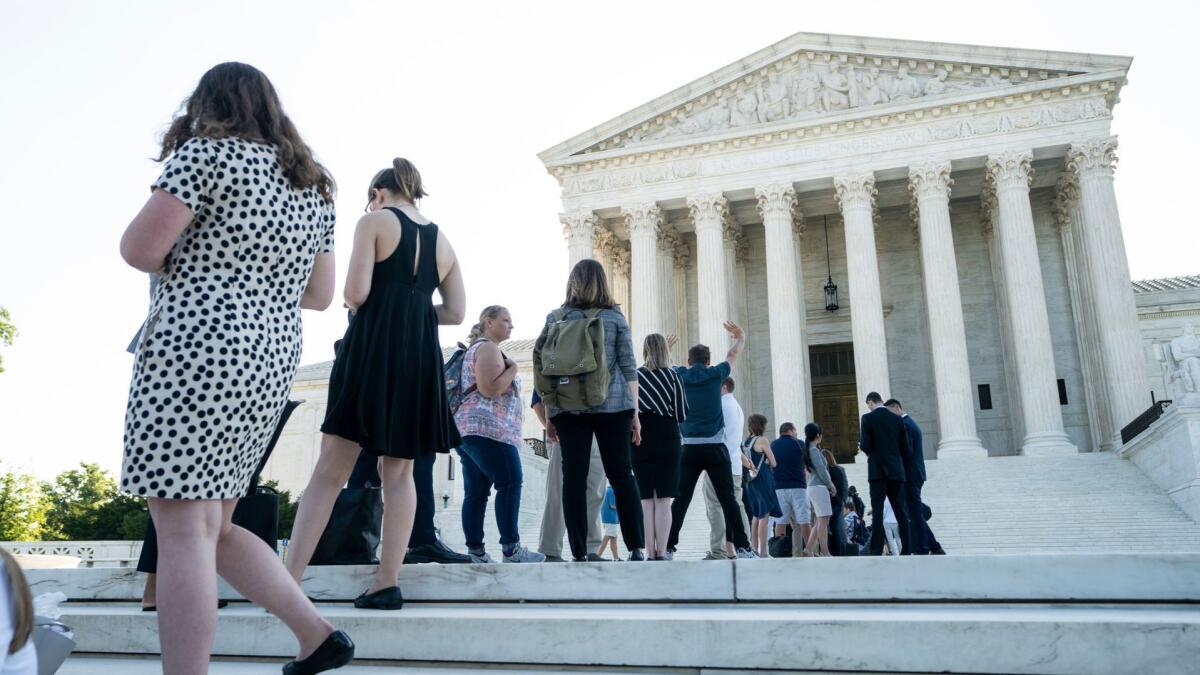As Supreme Court prepares to rule on 2020 census dispute, there’s a new legal skirmish

The Supreme Court on Thursday is set to decide a politically charged dispute over whether the Trump administration can add a citizenship question to the full census for the first time since 1950.
Chief Justice John G. Roberts Jr. announced that the final rulings of this term will come Thursday morning. That includes two cases on partisan gerrymandering as well as the census dispute, which has deep implications for California.
In an unusual development, a federal judge in Maryland who already ruled against the administration over the census said on Monday that he would take 45 days to weigh new evidence that Commerce Secretary Wilbur Ross intended to discriminate against Latino voters when he approved the new question. And an appeals court in a 2-1 decision said he may proceed.
With political power at stake, Supreme Court is set to rule on gerrymandering and the census »
The late skirmish is not likely to change the high court’s decision. But it could complicate how and when the matter is finally resolved.
The justices could follow the advice of Trump’s Solicitor Gen. Noel Francisco. He said this week they should ignore “a speculative conspiracy theory” about Ross’ motives and issue a decision that “fully and finally resolved” all the legal challenges to the citizenship question.
But some legal experts said it would be inappropriate for the Supreme Court to rule on the issue of alleged discrimination against Latinos, since that had not been part of the case until now. If the justices don’t act Thursday on the new issue, that could allow U.S. District Judge George Hazel in Maryland to consider new evidence.
But if justices on Thursday dismiss the other challenges to adding the citizenship question, the administration is likely to quickly appeal any attempts by Hazel to further block it from changing the census forms.
Looming over the dispute is the deadline set by the government. Census officials said they need a final decision by June 30 so they can begin printing the census forms.
Hazel was one of three district judges, all of them Obama appointees, who issued rulings that blocked the administration from adding the citizenship question. All three said Ross had violated the federal procedural law by giving a far-fetched reason for making the change.
Ross said he added the question to allow for better enforcement of the Voting Rights Act.
Hazel also said Ross had violated the Constitution’s command for an “actual enumeration” of the population. Now, he says he will consider whether Ross violated the Constitution’s “equal protection” clause by discriminating against Latinos.
The Supreme Court has been skeptical of efforts to block the question from being added. Last year, they shielded Ross from answering questions under oath from lawyers who were challenging his decision. And during the argument in April, the court’s five conservatives sounded ready to rule for the administration. They noted the law gives the Commerce secretary broad authority to conduct the census “in such form and content as he may determine.”
Last month, the challengers revealed what they said was powerful new evidence that Ross was swayed by a Republican strategist who had argued in 2015 that accurate citizenship data would allow for drawing districts that were favorable to Republicans.
It is not clear that this was news to the justices, however. Three years ago, they weighed a Texas case on drawing election districts, and they discussed the need for more accurate data on eligible voters. It was apparent then that drawing districts based on a count of eligible voters rather than the whole population would favor Republicans and hurt Democrats.
A ruling for the Trump administration in Department of Commerce vs. New York could undercut the political power of states like California. Experts predict that millions of households in areas with large immigrant populations would refuse to submit their census forms, leading to a severe undercount in these areas. Census data is used to divide political power among states and within states, and it also guides the allocation of billions in federal funds.
More to Read
Get the L.A. Times Politics newsletter
Deeply reported insights into legislation, politics and policy from Sacramento, Washington and beyond. In your inbox three times per week.
You may occasionally receive promotional content from the Los Angeles Times.







